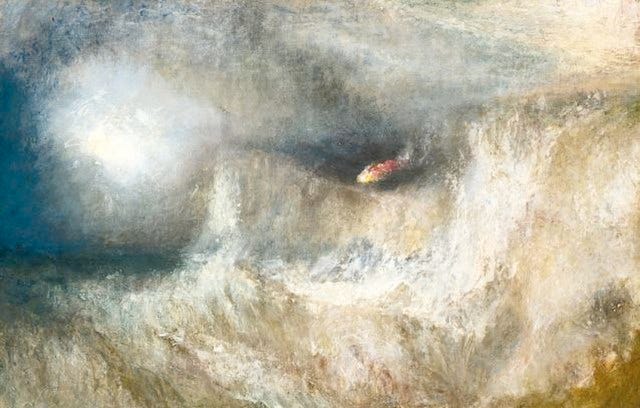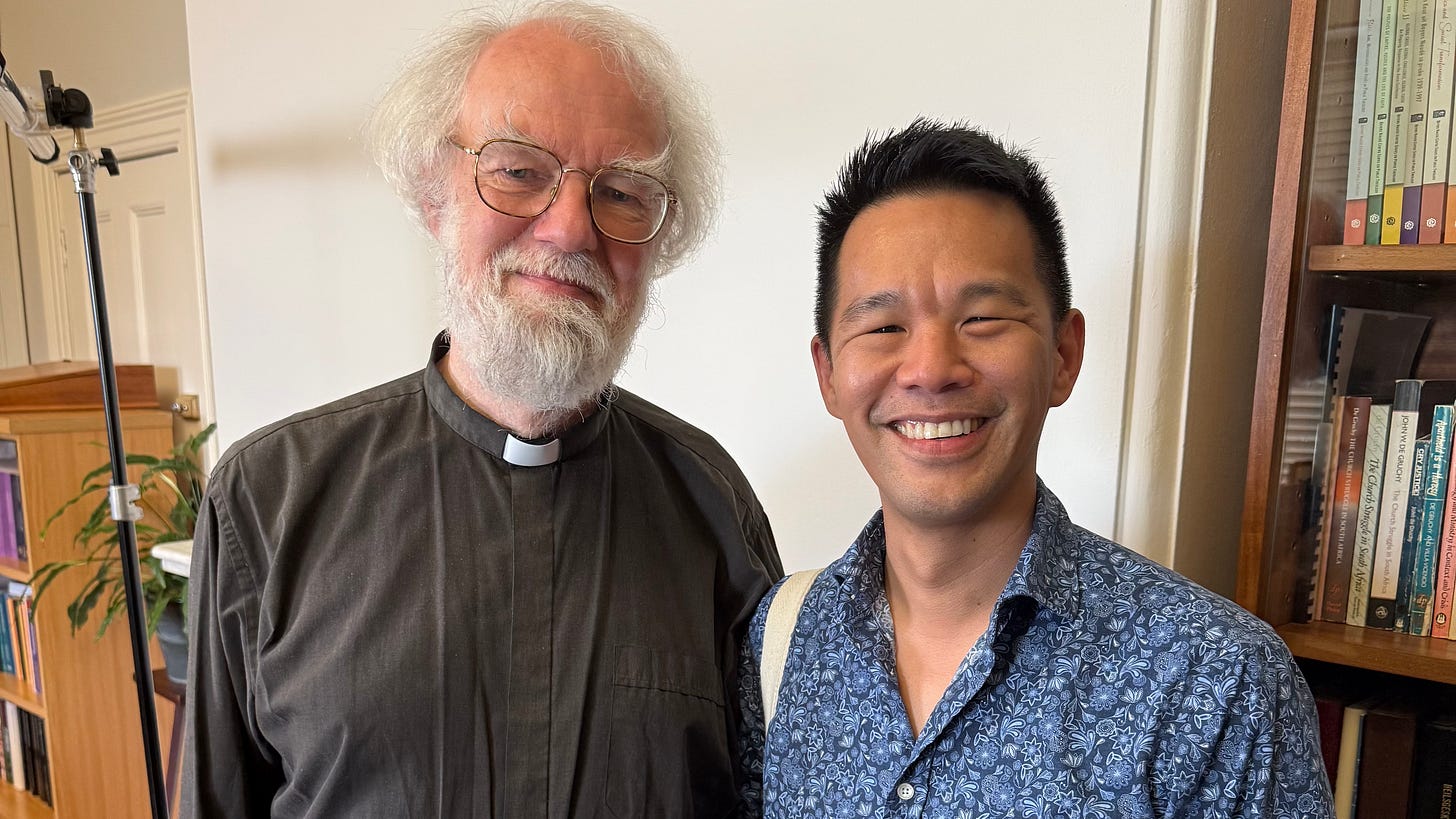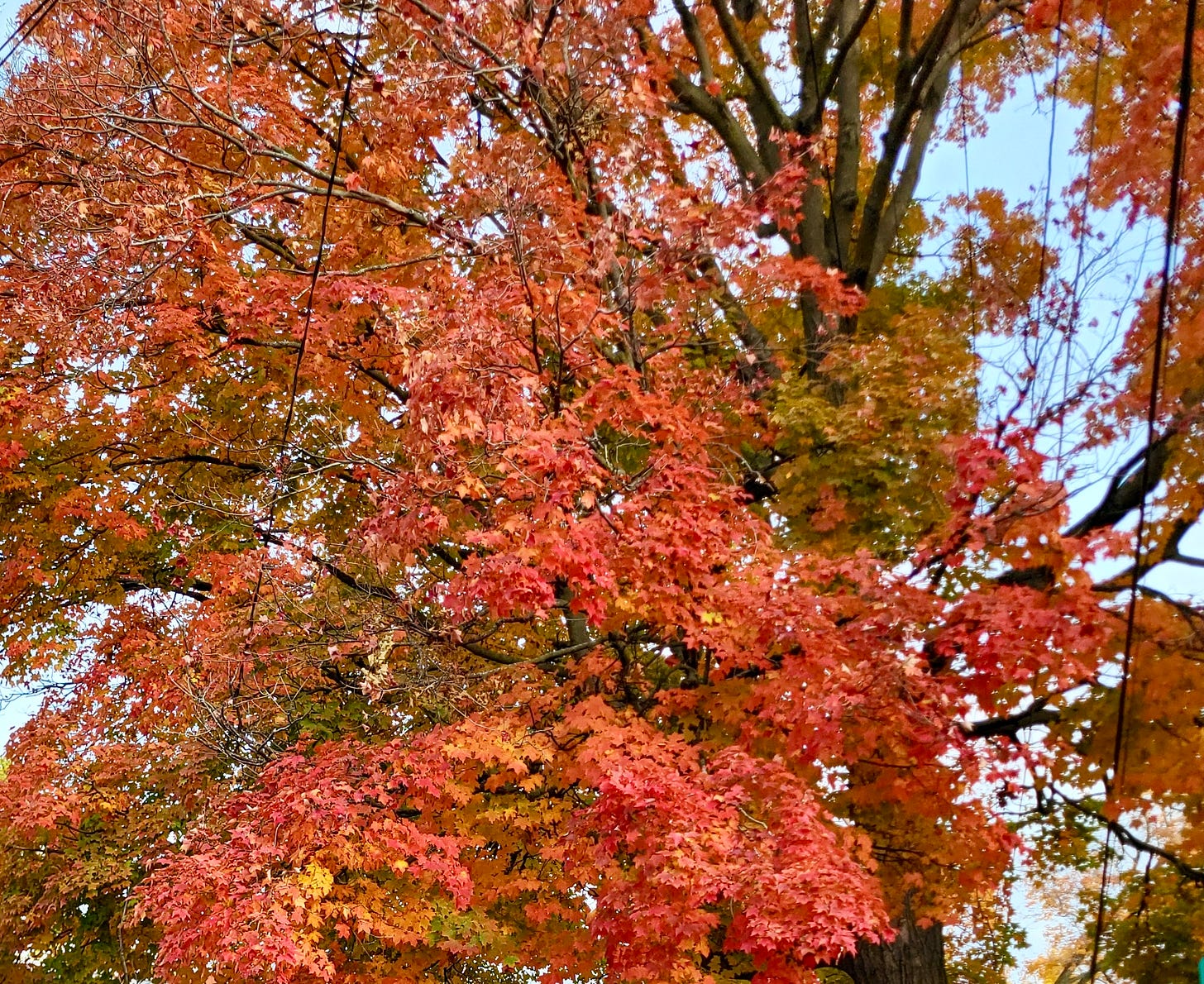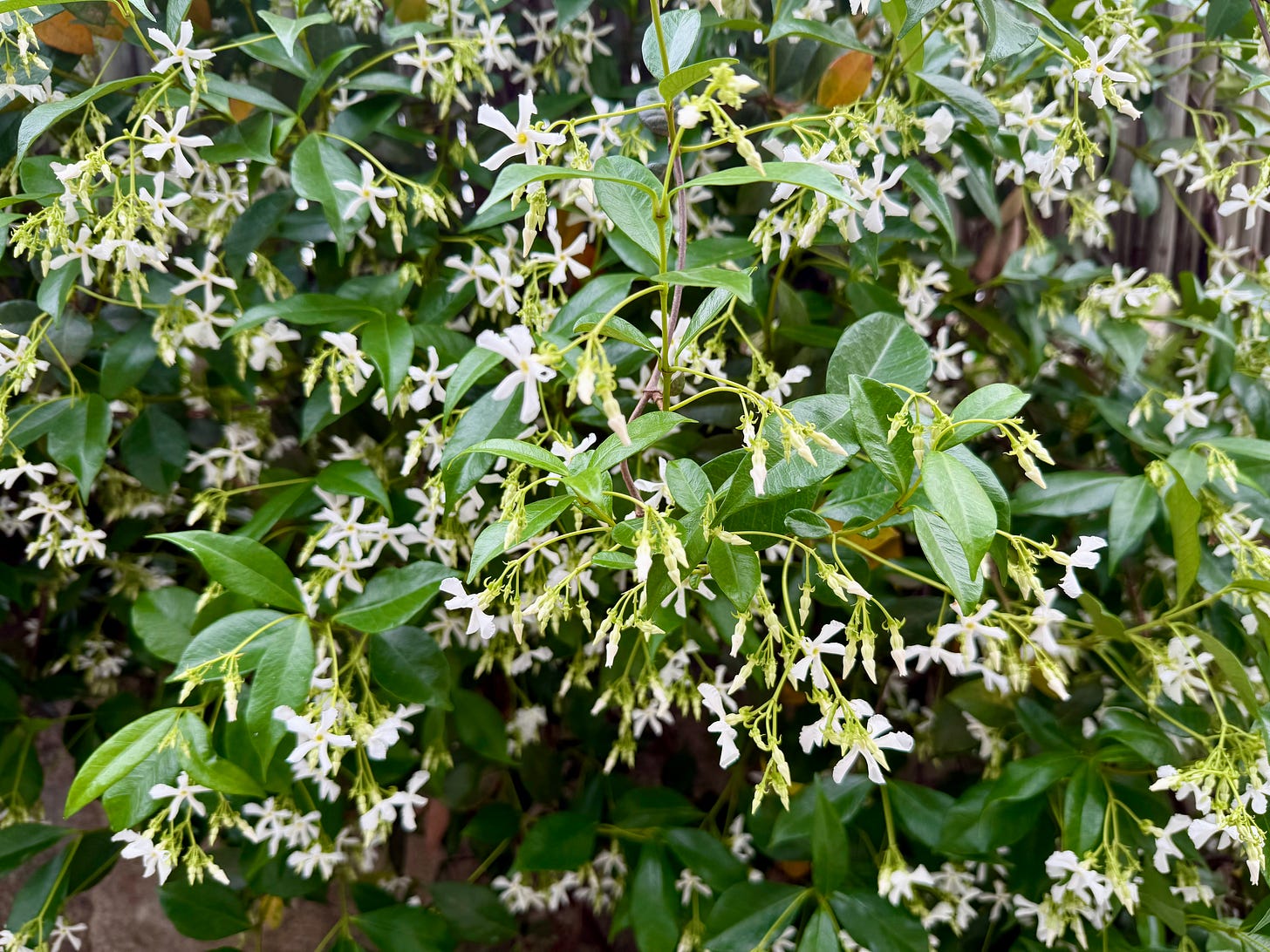The Radiance of Truth
Some fragmented thoughts on fear, anxiety, and hope, thanks to a conversation with former Archbishop of Canterbury Rowan Williams
Thursday, October 31
Stellenbosch, South Africa
Sometimes I sit down to write you, and I feel at a loss. I wish to urge you toward courage, yet I lack courage. I want to stir compassion in you, but surely, to do that, I ought to feel compassion. You know I can go on and on about grace, but what about the days when grace is scarce in my heart?
So the page stays blank, and the cursor keeps blinking.
Sometimes I sit down to write you, and I feel a bit foolish. Even when I catch a glimpse of hope, I’m not sure I believe my eyes—or maybe it’s more accurate to say that I’m afraid to believe. To have one’s hopes lifted is to risk even greater disappointment.
Perhaps there’s something to be said for simply naming the realest thing right now: I’m afraid.
--
Yesterday I attended a lecture by Rowan Williams, the former Archbishop of Canterbury. During the Q&A afterward, he discussed fear and anxiety. “We must look anxiety fully in the face and know how deeply it bites in our hearts. And we must then know that the anxiety has been seen and absorbed by God. When we are at risk of getting sucked into that spiral, that whirlpool, of anxiety, it is essential to go back to gratitude,” he said. “God has promised... And therefore I need not be anxious or afraid.” Then he added: “As a constitutionally anxious person, I speak as a sinner to fellow sinners.”
I understand the call to gratitude. Indeed I affirm it. Yet when faced with, say, the devastation of ongoing war, and/or the societal fractures we see not just in the U.S. but all over the world, and/or the cries of all creation, and/or the uncertainty ahead of next Tuesday’s election— I just don’t know how to summon adequate gratitude to outshout the fear and anxiety.
Earlier today, I got to sit down with Williams for an hour, so I pushed him a bit on this question. I want to agree with his assertion that our anxiety is seen and absorbed by God, yet I don’t feel it. “How?” I asked.
“The thing about anxiety, of course, is that we can’t just deny. It lives in us. It gnaws at us,” Williams replied. “The significant question then becomes, What do we do with that? Just as with any disturbance in the atmosphere, we can’t just say, ‘It’s not there!’ I think God gives us permission to look at our anxiety and to say, This is what I’m frightened of.” The naming is a prerequisite—the beginning of a surrender that’s also a summons. It is to say to God: Come now, this is beyond me, and I really need you to deal with it. “And by ‘absorbing,’” he continued, “I mean that, if you put it in the context of God’s fidelity, fear cannot have the last word. Fear will not have the last word.”
When I said that this still felt awfully abstract to me, Williams gave me an understanding smile.
“To what extent will you allow fear to dictate the terms of engagement? To what extent will you be pushed into the reactive, rather than assuming your agency?” he asked. “‘I tell you naught for your comfort/ Naught for your desire,/ Save that the sky grows darker yet/ And the sea rises higher.’ Do you know that? It’s G.K. Chesterton.”
He was quoting from Chesterton’s poem “The Ballad of the White Horse,” in which King Alfred, facing a pivotal battle, receives a visitation from the Virgin Mary. He asks her if he will win. She demurs, instead asking, “Do you have joy without a cause/ Yea, faith without a hope?”

Williams was offering me a twofold gift: first, a gentle reminder of the things I claim to believe and, second, a nudge to find some footing in the relics of past pilgrims. In moments of anxiety, Williams has found that poetry has provided him “a kind of solidity. And music too. Because these are things that have been imagined and can’t be unimagined, and these are ways in which people in the past have been attuned to truth and to reality, and they leave us with a sense of that attunement.”
He cited Bach’s St. Matthew Passion as another consolation. “It’s not consoling in the sense that it’s cheerful,” he said. Rather, listening to it is to Williams akin to “watching some enormous monster flailing around in a stormy ocean. The sheer imagining of it names that someone else has felt in the middle of it—something of the suffering, something of the trouble.”
The Psalms too, which offer what the Czech philosopher Jan Patočka has described as “the solidarity of the shaken,” Williams said. Others have felt in their bones the precarity of life and the nearness of death. If there cannot be immediate respite, at least through their testimonies, whether poetic or musical or in some other genre, we can feel a bit less alone.
--
My dissertation adviser, Robert Vosloo, is a Dietrich Bonhoeffer scholar, so I’ve been thinking a bit about Bonhoeffer while here in South Africa. (Vosloo is part of a group of Bonhoeffer scholars who recently wrote and published a letter cautioning against the misinterpretation and misappropriation of Bonhoeffer’s ideas and example in the current context. You can read that letter here.)
In late 1942, Bonhoeffer wrote an end-of-the-year reflection to a few friends. His essay sprawls across all kinds of topics, including stupidity (“a more dangerous enemy of the good than malice”) and optimism (“it is more sensible to be pessimistic”). His goal was to record some lessons he’d learned, in part so that he wouldn’t forget; he described memory as both “a gift of grace” and “part of responsible life.”
I keep returning to one section of that essay, about contempt for humanity, in part because I think this is a real risk for me when I’m in a place of fear. “The danger of allowing ourselves to be driven to contempt for humanity is very real,” Bonhoeffer wrote. While he acknowledged disdain’s allure, “through contempt for humanity we fall victim precisely to our opponents’ chief errors.”
Bonhoeffer’s primary preoccupation here wasn’t his opponents’ contempt for him but the possibility of his own contempt for them. “Whoever despises another human being will never be able to make anything of him. Nothing of what we despise in another is itself foreign to us,” he wrote. “How often do we expect more of the other than what we ourselves are willing to accomplish.”
“The only fruitful relation to human beings—particularly to the weak among them—is love, that is, the will to enter into and keep community with them,” he continued. “God did not hold human beings in contempt but became human for their sake.”
Bonhoeffer didn’t say “pleasurable,” “easy,” or “fun”; he chose the word “fruitful.” You know it’s near impossible for me to resist a good horticultural metaphor, and this one seems especially apt. No faithful gardener will ever pretend that cultivation is delightful or effortless. It demands patience, attention, and diligence—and even then, there’s only so much we can control.
That relinquishing of the illusion of control is, I think, both the hardest and also the most hopeful act—to acknowledge what is beyond us, to open ourselves not just to what is but also to the possibility of what might or will be. Honestly, I don’t know how to do that apart from my faith. I’ve long said that I must believe in God because I need somebody much greater than myself to redeem all this. [Insert flailing hands here.]
--
Toward the end of my conversation with Archbishop Williams, I asked him where he finds his hope nowadays. “I take it where I can find it,” he replied. “A visit to a primary school, for instance, like the one where my daughter teaches. In my grandson, who is three years old next week. It might be a visit to a parish; I was in Dublin, Ireland, for a weekend about a month ago with a Catholic parish working on its own spiritual renewal, and I came away thinking, This can be done! Some teenagers that I met who are working on some community projects. As I said, you take it where you can find it.”
Some time ago, Williams met with youth engaged in protests about climate change. Their passion moved him. “I said to them, Look, you may or may not save the world. But what you need to remember is that this is still something worth doing,” he told me. “Because it wasn’t just protest—it was also a celebration of something.”
The word “celebration” surprised me. But he wasn’t calling for a victory party—there has certainly been no victory yet—so much as an act of honor, a sort of solemnity that is also conscious recognition: “By ‘celebration,’ I mean that it is worth aligning yourselves with the way the world is rather than by the way the world isn’t. I said to them, I hope you will change the world, but hope is also to be found, if I dare put it a bit dramatically, in the radiance of truth.”

--
The not-so-radiant truth is that I am afraid. But also? That fear feels just a bit less heavy today than yesterday, when I started writing you this letter, thanks to a kindly Welsh pastor who was willing to sit with me to point me back to gratitude.
Maybe tomorrow I’ll feel more afraid again. Probably, on Tuesday, when I’m back in the U.S. and I step into the booth to vote, I’ll be trembling a bit.
Again and again, I know I will have to go back to the deep well of gratitude. And through it all, I want to cultivate the hope that’s to be found in the radiance of truth. The most radiant truth I can think of: I believe in a love that has otherworldly power and in a God who not only has pledged to redeem all things but also is constantly providing reminders of that promised renewal.
Back home in Michigan, it is autumn. Tristan sent me a picture of the maple tree in front of our house ablaze with oranges and reds—a furious burst of glory before the leaves fall. Here in South Africa, it is springtime. The jasmine outside my window is in full bloom, and through the open window, I can smell its sweet perfume.
With love and in gratitude,
Jeff
p.s. As always, I love to know what resonates with you and what doesn’t. What do these ramblings stir up in your heart and in your mind? Ever thankful for your accompaniment along the way.







“By ‘celebration,’ I mean that it is worth aligning yourselves with the way the world is and could be, rather than by the way the world isn’t." I found this to be very powerful
Jeff all of this resonates with me as I am living in fear. Thankyou. So good!